- Home
- Hammond Innes
High Stand Page 6
High Stand Read online
Page 6
PART II
Ice Cold Creek
1
It’s an odd feeling sitting with earphones on and a drink in one’s hand listening to a symphony concert and looking down through drifting cloud to a scattering of growlers so far below that the sea appears dusted with salt, the pack-ice beyond and an occasional berg. Tim Severin would have been glad of this aerial view when his leather hide boat was caught in the ice, for it showed St Brendan was right. Even now, almost fifteen hundred years after that Irish saint recorded the details of his voyage to North America, there was still the ice-clear gap between the pack and the coast of Greenland. It showed quite clearly from where I sat, 37,000 feet above sea level, a dark lane of water, and beyond it great rivers of snow and ice sweeping down between the black mouths of overlapping craters, and then the white blank-out of age-old, depthless snow as we whispered our way across the Greenland icecap. Baffin Island for lunch, the sun standing still as we flew almost as fast as the earth was spinning with bergs like ships between dark-coloured outbreaks of land. Black, black mountains, sheer cliffs, everything brittle-bright, the clarity of the air unbelievable.
The man next to me leaned across. ‘Don’t want to drop into that lot, eh?’ It was the first time he had said a word. ‘Guess we must be just about over the spot where Franklin and all those others wintered and died.’ He looked at me hard, steel-grey eyes and a baldish head. ‘First time you bin on this run?’
I nodded.
‘Thought so. I do it three, four times a year. Always Wardair.’ He nodded emphatically. ‘I got contracts to supply you people with fruit, apples mainly.’ He smiled a hard, tight-lipped smile. ‘You wouldn’t believe it, but we grow them right in the middle of the Rockies. Grapes, too. You should take a trip up and see for yourself. And this is the right time, Indian summer weather, real warm.’ He reached into his jacket pocket, produced a business card and placed it on my meal tray. ‘Be happy to show you around.’ He nodded, pushed his earphones back in place and was lost to the world again.
We crossed Slave Lake, the Rockies looming ahead, the murmur of the engines barely audible as we began to slide down the sky towards a world of jagged peaks and the dirty yellow of snow that had lain exposed all summer. On and off I had been thinking of Miriam. Almost a month ago she had come this way, maybe in this very seat since she, too, had flown Wardair. Had the sky been as clear as it was now? Had she sat there looking down on the barren, ice-scarred land below, thinking of her destination, knowing the Yukon border was only a few hundred miles away to starb’d? And not a word since that postcard.
It had seemed strange enough back in England, but now that the wild bleakness of northern Canada was spread out below me, the vastness of it and the loneliness, it seemed stranger still. To have reached out to somebody as she had — never mind the reason - and then to cut the contact as though it didn’t matter any more. All that space, a wilderness of mountain, lake and scrub just beginning to take on an autumn blaze on the heights below the snow line, and in the Yukon, on the ground, it would still be a vastness of space full of rock and trees, the humans few and strange. Surely in the remoteness of that glacial national park, having penetrated to Ice Cold Creek, she would have come back urgent to tell me about it, about the mine, about what she had found. It didn’t seem natural that she should suddenly have gone silent on me, not now that I, too, was conscious of the vastness, experiencing that sense of smallness and loneliness that she must have felt.
There was a marvellous view of Vancouver sitting like a miniature Manhattan surrounded by vast expanses of sun-bright water as we came in to land. Ships, and tugs with long trams of barges, some with log rafts, the Strait of Juan de Fuca reaching out to the American mainland and the distant shapes of snow-clad mountains. It was for this, and the sight of the Arctic Ocean, that I had flown the northern route instead of the more prosaic and slightly cheaper route via Edmonton. As soon as I had settled into my hotel, which was in the rather congested eastern part of Vancouver known as Gas Town, I took a taxi across town to the Bayshore Hotel. It was right on the water, close against the old wharfs and boatyards of Coal Harbour.
At reception I was able to confirm that Miriam had in fact spent three nights at the hotel the previous month, but she had left no forwarding address and had not booked in again. Presumably while staying at the Bayshore she had made contact with friends, or people her husband had known, and had been invited to stay on with them on her return from Whitehorse. It was something I had expected, but it still came as a disappointment. At the back of my mind, I suppose, I had been hoping to have her company for the evening. Instead, I walked through Stanley Park as far as the light on Brockton Point with its view of the First Narrows and the Lions Gate Bridge, then dined at a restaurant in Coal Harbour.
This half-derelict area between the Canadian Pacific railway tracks and the waterfront is almost the last remaining relic of the old part of Vancouver, and after my meal I wandered round the whole complex of crumbling boatyards, half-collapsed wharfs and charter boat offices. The air was very still, a warm, balmy night, the water dead calm and the only sound the slap of wavelets against the wooden piers as the wash of the occasional yacht or motor cruiser reached the shore. It was a late night tour of one of the most atmospheric parts of the city that was later to save my life. But I didn’t know that at the time, of course, and spent several minutes at the end of a tumbledown jetty looking enviously across the water to that extraordinary marina of timber housings over towards Deadman’s Island that shelters the Royal Vancouver Yacht Club’s motor cruiser fleet. I would dearly have liked to ‘borrow’ one of those craft to explore the waters between Vancouver Island and the mainland. At least it would be nice to be staying here at the Bayshore with that magnificent view across to the lights of the North Shore with the Rockies beyond. So much to see, so much of grandeur and beauty, and neither the time nor the money.
Next morning the sun shone out of a clear blue sky and I strolled up Cordova Street, Granville and Dunsmuir and south down Burrard as far as Robson’s Square. It was on Robson Street that the solicitors who had drawn up the timber agreements had their offices, on the twenty-first floor of a tall glass building with a view past the green copper summit of the Hotel Vancouver to the BC Ferries’ jetty and the CPR tracks running towards Coal Harbour. By comparison with my small set-up at Ditchling their premises were palatial. I had no appointment and was quite prepared to arrange for a meeting either the following morning before my plane left for Whitehorse or on my return. However, the partner who had looked after Halliday’s Canadian affairs was available and after only a short wait I was shown into his office. His name was Roy McLaren, a paunchy, heavily built man of about fifty with thick gold-rimmed glasses which gave his round, rather boyish face a look of enquiring wonder. Yes, Mrs Halliday had been in to see him — he reached for his diary, turning back the pages — ‘I think I gave you the date in my letter.’
I nodded. ‘And you haven’t seen her since?’
‘That also I said in my letter. Neither her nor her husband.’ He looked across at me from behind his glasses. ‘Did you know Tom well?’
I had to explain then that I had only acted for him in the matter of his Will and had known him for no more than three years. ‘Ah well,’ he said, ‘we’ve been acting for him since his father died. And the firm, of course, acted for his father before then. I’m afraid I never knew Josh Halliday. A great character by all accounts. My uncle was the one who dealt with him.’ He put his hands together, the fingers forming a steeple, pressing them hard as he stared at me enquiringly, an expression of large-eyed innocence. ‘When Tom inherited my uncle handed him over to my father. This is a very inbred firm, you see. Even my eldest sister is a partner. Damn good lawyer, too.’ He relaxed his fingers, smiling. ‘I took over Tom’s affairs here when my father retired about six years ago.’
‘About the time the output from the Yukon mine was beginning to decline.’
‘I didn’t know any
thing about that. There was some talk about it later, of course, but at the time all I was concerned with was drawing up the agreements for the sale of timber on that property of his up north along the coast. He was acting on the advice of a forestry man named Hugh Ringstrop over by Campbell River.’
‘Did Ringstrop negotiate the price?’
He nodded. ‘Yes. And he marked out the areas. He was Tom’s forestry adviser.’
‘And that last sale agreement?’ I asked. ‘Did he negotiate me price for that too?’
The fingers pressed tight again. ‘Not sure, but I think so. I remember he said it would be difficult to get an export licence, and anyway the stand was really too young. “Hadn’t reached maturity” was one way he put it.’
‘But you still drew up the agreement.’
‘Yes.’
‘Knowing about the curse.’
‘Ah!’ The fingers pressed very tight, the eyes wide and innocent behind the thick glasses. ‘Yes, of course — we sent the deeds over to his bank in London above five years ago. That was after the divorce had gone through and he remarried.’ He smiled. ‘You never met his first wife, of course.’ The hands fell suddenly flat on the desk. ‘A very beautiful, very terrible woman. I think he might have killed her if she hadn’t gone off with another man. Martina. They had two sons. Which brings me to something else. There has been one small development since I replied to your original letter.’ He pressed a bell on his desk and a very severe-looking woman in a bright pink cotton dress came in and handed him a folder. The younger of those two sons - do you know him?’
‘Brian?’
He nodded. The woman went out, closing the door without a sound.
‘Yes,’ I said. ‘You’ve seen him, have you?’
He was smiling again, the eyes slitted now and wrinkles showing. He opened the folder. It contained a single sheet of typing and some newspaper cuttings. ‘He came to see me -week before last. His father has left him the Cascades, is that right?’ And when I nodded, he went on, ‘I didn’t altogether approve of his manner, or his dress for that matter, so I taped the whole interview. It didn’t last long. Five or six minutes, that’s all. Then he was gone.’
‘It was about the Cascades he came to see you, was it? An area of timber he calls High Stand.’
‘That’s it. Four hundred hectares of what Ringstrop describes as the finest plantation of western red cedar he has ever seen.’ And he added, ‘I’ve written to you, giving the gist of our conversation, but my letter probably arrived after you’d left. I was on holiday last week, fishing up the coast by Kelsey Bay.’ He picked up the largest of the newspaper cuttings, unfolded it and passed it across the desk to me. ‘This appeared while I was up the coast. Recognize anyone?’
It was a full page of the Vancouver Sun, half of it taken up with a picture of a huge barge under tow. The barge was piled high with the rounded trunks of large trees and below the steel hawsers of the towing bridle, riding the barge’s bow wave, was a man in an inflatable holding aloft a banner. He wore a baseball hat and a T-shirt with Greenpeace on it, and the words on the banner were the same as the headline that flared across the page:
GREEN SOLDIERS AGAINST POLLUTION Killed in Action Below were three smaller pictures, one of a tree falling in a clear-felled section of forest land and under it a quote — An unknown soldier of the forest. The middle picture showed a close-up of the man holding the banner. The long face, prominent nose and high cheekbones, the black hair showing beneath the cap and the way the ears stood out, even the same T-shirt. The third showed the inflatable, one side collapsed, the man with the banner diving over the side, and above him a man leaning over the bows of the barge with a boathook in his hand.
I looked across at McLaren. ‘Brian Halliday?’ He nodded. Taken last Wednesday. I’m told the silly fool nearly lost his life. But he had it all organized and was intent on causing the SVL Timber Company and the towing people as much hostile publicity as possible. There were film cameras out there and he deliberately let himself be run down. He dived overboard, as you see, just as the inflatable was trampled under by the bows of that tow. Damn lucky, if you ask me. He was picked up by a salmon fisher. By then he was half full of water, but uninjured except for a few bruises and abrasions. It was all on TV that same night. And the next day Greenpeace disowned him. Said it was nothing to do with them. They’re concentrated on whaling again, not running a West Coast save-the-trees campaign. Without their backing the story had a quick death, but he certainly made an impact. I watched the TV film of it on a friend’s boat and it was quite an action spectacular.’
‘The logs were presumably from the Cascades property.’ He nodded. ‘From the plantation he calls High Stand. It’s all there in the caption story at the bottom of the page.’ He rang the bell again and the woman in the pink dress appeared. ‘Copy these cuttings for Mr Redfern, will you.’ He handed her the file. ‘Then you can look them through at your leisure. Not that they’ll tell you anything you don’t already know.’ He glanced at his watch.
I apologized again for interrupting him and he smiled and shrugged and said, ‘Not to worry, but it is Monday, and that’s never a good day. Is there anything else I can do for you?’
‘Just one thing,’ I said. ‘That sale agreement dated 20 September of last year. I take it that was the only one you drew up for Tom Halliday covering the western red cedar down by the river, the High Stand area?’
He nodded, smiling, his hands forming a steeple of his fingers again. ‘I know what you’re going to ask. I phoned the office the very next day and had my son get on the phone to SVL Timber in Seattle. He was informed that they were still working to the agreement covering the two hectares. The logs were of exceptional quality and because of that they would be kept clear of the water, no rafting or parking them in a booming ground the way they do pulp. Instead, they were bringing them down by barge and, again because of the quality, had spaced the delivery dates. Last week’s tow was the second of three separate deliveries to be made to the mill.’
‘And they won’t be cutting any more trees?’
‘Definitely not. Hugh Ringstrop made that quite clear to them - no trees could be felled, outside of the original two-hectare lot, until a new sale agreement had been negotiated and signed.’ The fingers pressed hard together and he added, ‘And, of course, nothing can be signed until Mr Halliday is found. That they understand and accept.’
I wasn’t sure about that and I wondered how forcibly his son had made the point. But when I told him about Wolchak’s offer, he nodded. They made similar approaches, first through Ringstrop, then direct to us. That was just after Tom was reported missing.’
‘You didn’t say anything about that in your letter to me.’
‘No?’ He hesitated. ‘No, you’re right. I thought about it, but it didn’t seem relevant. Not then. If Tom Halliday was dead, then of course I would have let you know. But right now any sale of the property is legally out of the question.’
I had a few other queries, small points of law mainly concerned with Tom Halliday’s position as a Canadian citizen and how the estate would stand from a tax point of view if that proved to be the basis on which we had to operate. Then I left him with the assurance that I would see him again before leaving for England if my visits to either the mine or the forestry area raised any further queries. To my surprise he had not been to either of the properties himself. ‘Our business is very much centred on Vancouver, companies chiefly.’ This as he rose to see me to the door. ‘My father and my uncle had a great many personal clients, but most of them are dead how and times have changed. The sons have tended to move into companies. It’s just the way we have expanded.’
I picked up the copies of the press cuttings from the pink dress, now looking even more severe with her glasses on the end of her nose and seated behind a word processor.
I lunched later that morning at a fish restaurant virtually under the high span of Granville Bridge, reading carefully through the press cutti
ngs as I ate.
One of the cuttings had given the names of the towing company as Angeles Georgia Towing of Port Angeles, which my map showed to be just across the Strait of Juan de Fuca from Victoria and the south end of Vancouver Island, an ideal position for a tugboat company. I phoned them as soon as I got back to my hotel and when I said I had a query about the Cascades I was put straight through to Mr Stutz who sounded gruff and very Scandinavian. What I wanted to confirm, of course, was whether this was the second of three barge-loads and that there had not been any further felling of timber. ‘Ja,’ he answered immediately, ‘I think you are informed correctly, there is vun more tow to make.’
‘Only one?’ I asked.
‘Ja, vun only.’
‘When will you be towing it down?’
‘I dunno. No orders yet.’
‘But there are definitely some more logs to bring down?’
He didn’t answer that and when I asked him exactly how much timber was allowed for in the export licence, he said, ‘Look, who are you? A newspaper man, no?’
‘The owner’s English solicitor,’ I said and he closed up on me, referring me to SVL Timber. ‘Ve just tow. I know nothing about the ownership of timber, nothing about legislation. Okay?’
I had a thought then. ‘How many tugs do you operate?’ I asked him.
‘What you say? — how many tugs I got? None of your business. You talk to SVL, okay?’ And he put the phone down.
But when I got through to SVL Timber I found myself dealing with a Mr Barony who was as smooth as the towing company man had been gruff. There was one more load to be towed down under the existing agreement. It hadn’t yet been decided when. ‘I guess you’ve seen the reports of young Halliday putting himself under the barge. Well, we don’t want a repetition of that, do we, whether he’s a Greenpeace man or not, so you’ll appreciate when we do decide on a date for the tow we won’t be announcing it to the press.’ And he gave a gentle, conspiratorial chuckle.

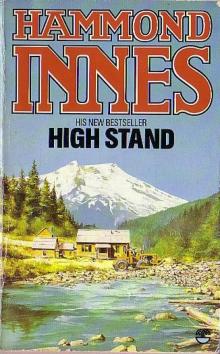 High Stand
High Stand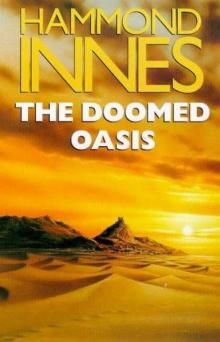 The Doomed Oasis
The Doomed Oasis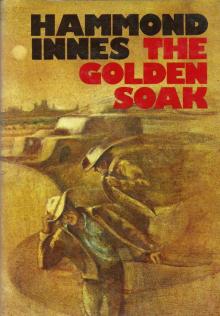 Golden Soak
Golden Soak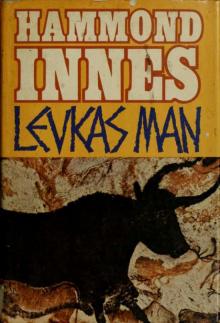 Levkas Man (Mystery)
Levkas Man (Mystery)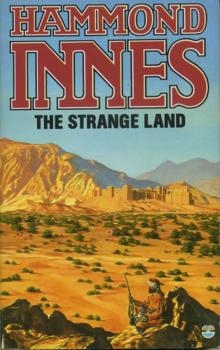 The Strange Land
The Strange Land Dead and Alive
Dead and Alive Attack Alarm
Attack Alarm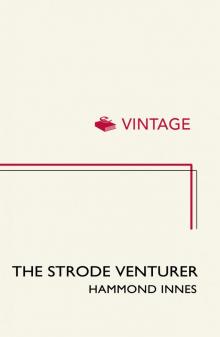 The Strode Venturer
The Strode Venturer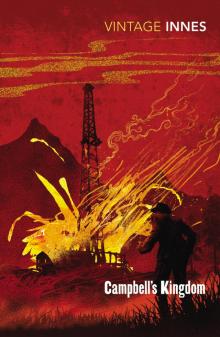 Campbell's Kingdom
Campbell's Kingdom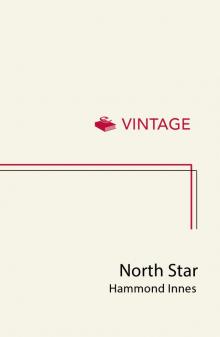 North Star
North Star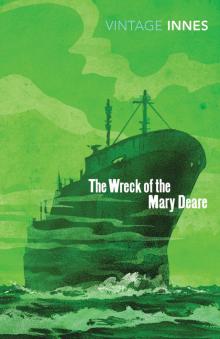 The Wreck of the Mary Deare
The Wreck of the Mary Deare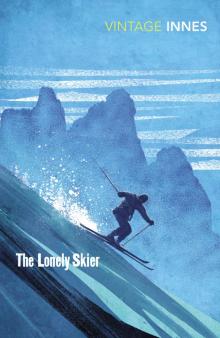 The Lonely Skier
The Lonely Skier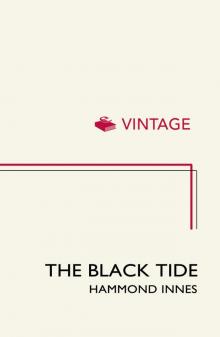 The Black Tide
The Black Tide The Trojan Horse
The Trojan Horse Medusa
Medusa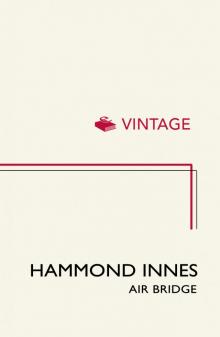 Air Bridge
Air Bridge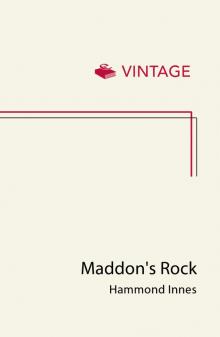 Maddon's Rock
Maddon's Rock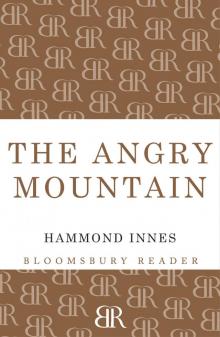 The Angry Mountain
The Angry Mountain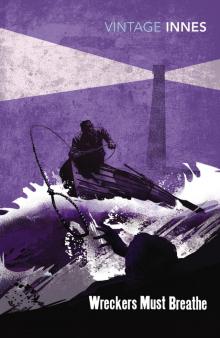 Wreckers Must Breathe
Wreckers Must Breathe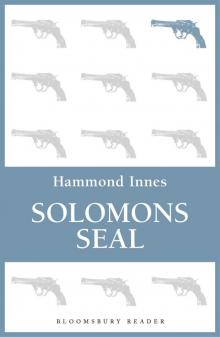 Solomons Seal
Solomons Seal The White South
The White South